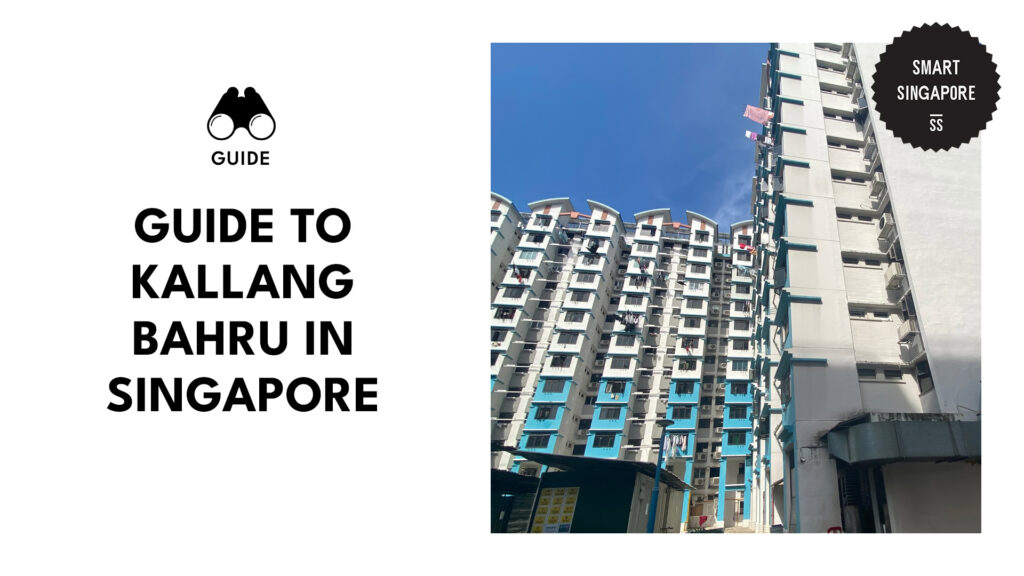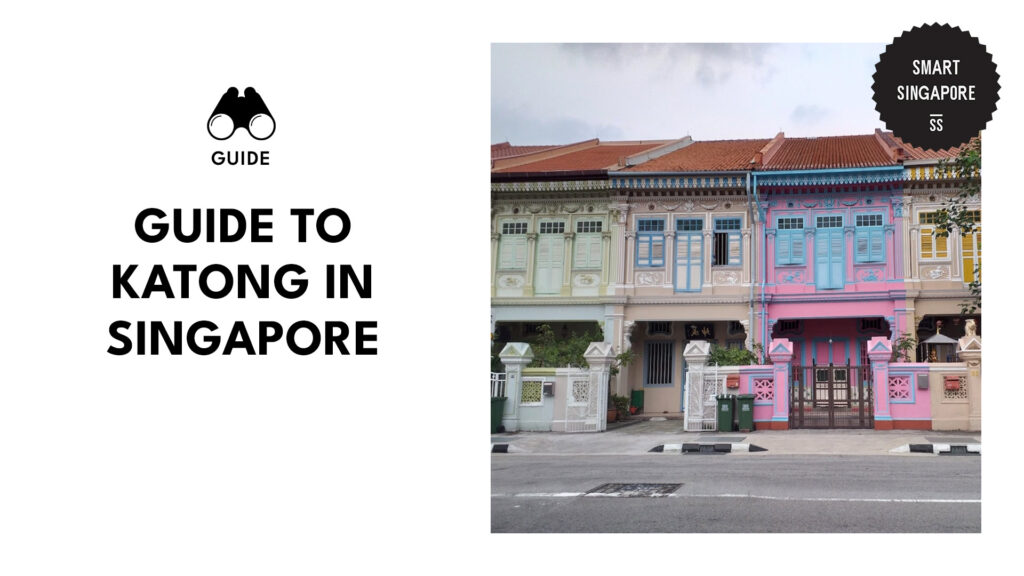Categories > Guides and Tips
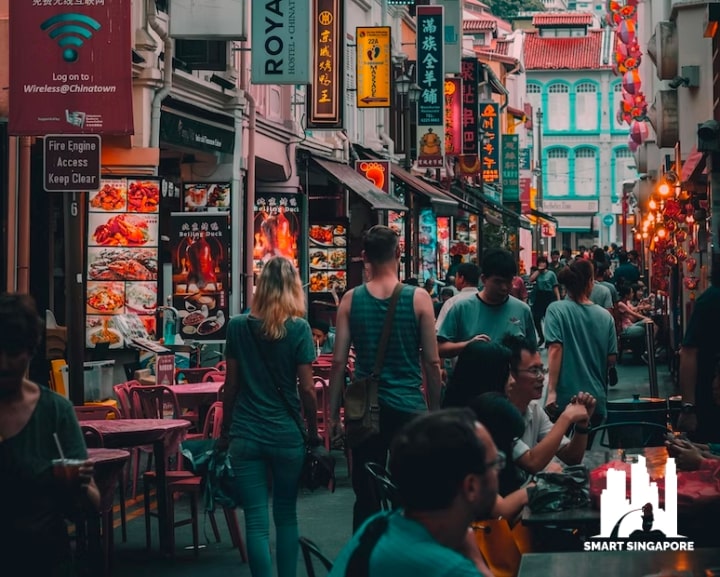
What to Eat in Singapore: A Foodie’s Guide to the Lion City
- What is the most popular food in Singapore?
- What do Singaporeans like eating?
- Is it cheap to eat in Singapore?
- What are the must-try traditional dishes in Singapore?
- Hainanese Chicken Rice
- Nasi Lemak
- Laksa
- Char Kway Teow
- Roti Prata
- Fish Head Curry
- Bak Kut Teh
- Satay
- Chili Crab
- Kaya Toast
- What fusion dishes should I try in Singapore?
- Salted Egg Yolk Crab
- Nasi Lemak Burger
- Prawn Laksa Pasta
- Where are the types of places to eat in Singapore?
- What are the dining etiquette practices in Singapore?
Welcome to sunny Singapore, where the food scene is absolutely lit! This guide is specially curated for foodies who are eager to know what to eat in Singapore.
Singapore is well-known for its plethora of food options, boasting Chinese, Malay, Indian, and Western culinary influences. From hawker centers to atas restaurants and hipster cafes, there’s something for everyone!
What is the most popular food in Singapore?
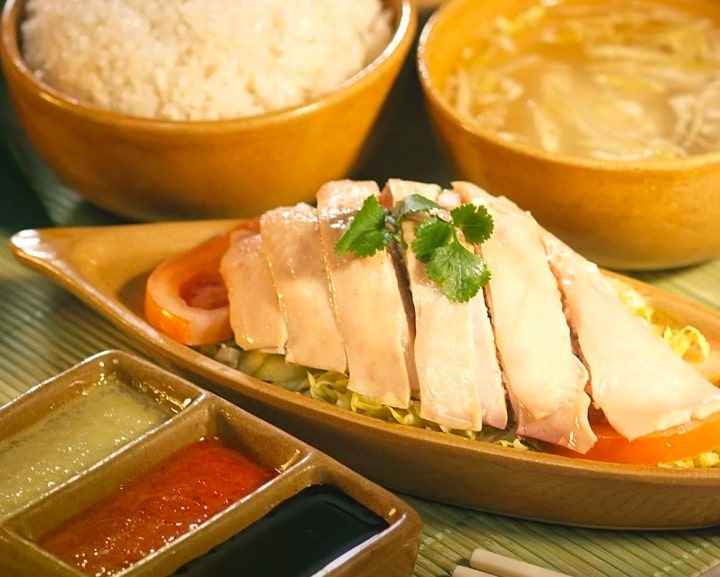
Hainanese chicken rice is a favorite dish in Singapore and probably the most famous dish in our country. It’s because it’s scrumptious, full, and reasonably priced.
The dish includes fragrant rice cooked in chicken broth with garlic, ginger, and pandan leaves as well as tender steamed chicken. Chipotle and black soy sauce are given as dipping sauces.
Hainanese chicken rice is also regarded as a national dish and a part of Singapore’s culinary legacy, giving it a special cultural and historical value.
The Hainanese people, who immigrated to Singapore and Malaysia in the early 20th century, are credited with creating the dish, which has since become a cherished staple of Singaporean cuisine.
The countless honors and distinctions that Hainanese chicken rice has garnered, both nationally and internationally, have also helped to increase its appeal.
What do Singaporeans like eating?
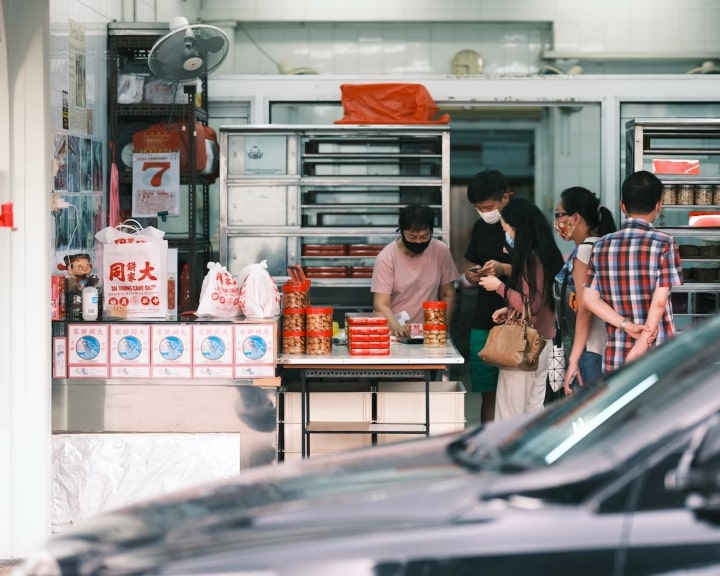
Singaporeans like eating a wide array of cuisines. In addition to Hainanese chicken rice, other favorites include char kway teow, a stir-fried noodle dish, and laksa, a noodle soup made with coconut milk and spices.
They also enjoy a range of street foods like satay, which are grilled skewered meats, and roti prata, a type of flatbread eaten with curry dipping sauce. Shellfish like chili crab and black pepper crab are also beloved.
Singaporeans surely savor a wide variety of mouthwatering dishes!
Is it cheap to eat in Singapore?
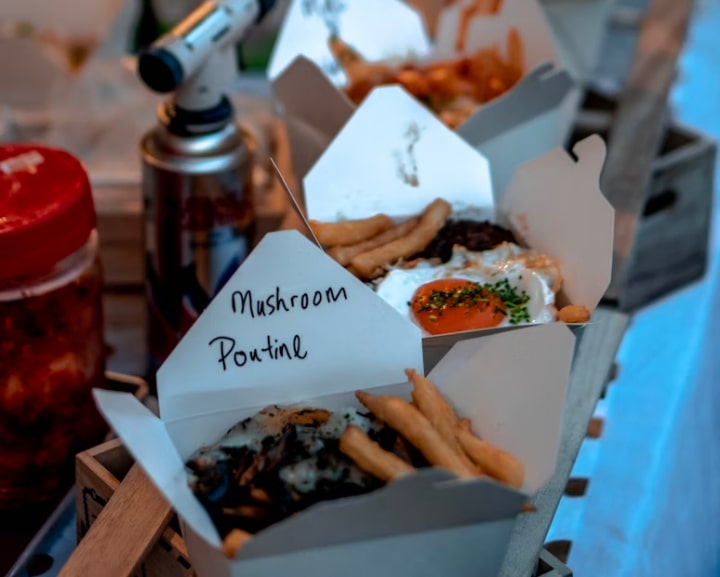
Depending on where you dine and the type of food you select, eating in Singapore can be anywhere from reasonably priced to rather pricey.
Most of the time, a local hawker center or food court can be cheaper than a restaurant in a touristy area or a high-end restaurant.
| Price Range | Places | Dishes | |
|---|---|---|---|
| Low-Budget | $3 to $5 | Hawker centers: Tiong Bahru Market, Maxwell Food Centre, and Chinatown Complex Food Centre | Chicken rice, laksa, or nasi lemak |
| Mid-Budget | $10 to $40 | Restaurants, cafes, and food courts: Nam Kee, Five Star Kampung, and Ippudo | Hainanese chicken rice and black pepper crab |
| High-budget | $50 or more | Fine dining and gourmet food: Odette and Burnt Ends | Kegani Crab and Taramasalata and Bone Marrow Bun |
What are the must-try traditional dishes in Singapore?
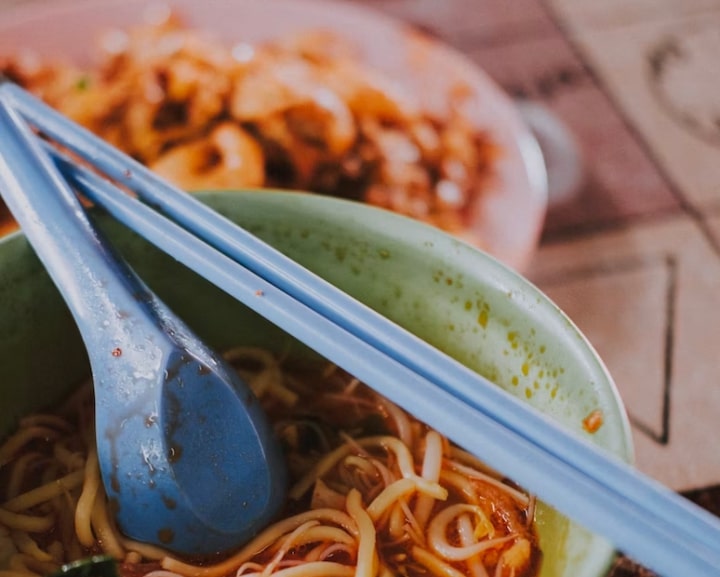
Singapore is a great place for people who love to eat. It has a wide range of unique, tasty meals that come from Chinese, Malay, Indian, and Western cuisines.
Here are some meals that you must try to get a taste of the unique food in Singapore:
Hainanese Chicken Rice
From g.i.f.f.y
Hainanese chicken rice is a dish that stands out as a must-try hawker food in Singapore.
Chicken that has been poached or steamed is given with rice that has been cooked with chicken stock and spices to make it smell good. Usually, it comes with a range of sauces and other toppings.
- Best place to try: Tian Tian Hainanese Chicken Rice
- Where: Maxwell Food Centre
- Price: $15
Nasi Lemak
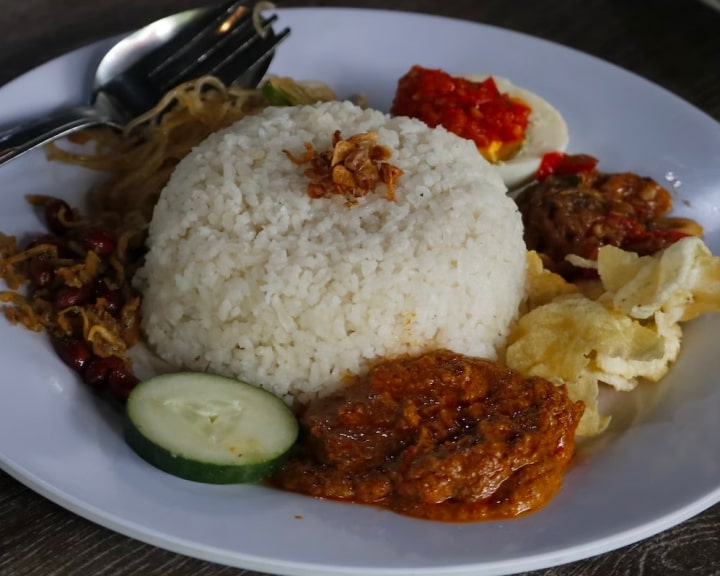
This staple of traditional Malay cuisine is rice cooked in coconut milk and served with a variety of toppings, including fried chicken, crispy anchovies, peanuts, cucumber, and sambal chili paste.
It’s so popular that some even call it Singapore’s “national dish.”
- Best place to try: Boon Lay Power Nasi Lemak
- Where: Boon Lay Place Market and Food Village
- Price: $3.50 to $5.50
Laksa
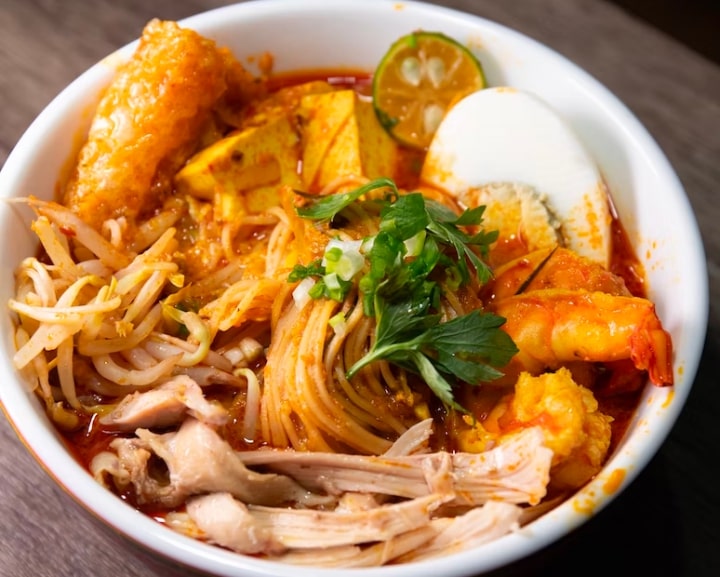
Laksa is known for its spicy broth and noodles. Rice noodles, coconut milk laced with a fiery curry, seafood, chicken, or other meat, and a smattering of herbs and spices make up the soup.
- Best place to try: 328 Katong Laksa
- Where: United Square Shopping Centre
- Price: $5.50
Char Kway Teow
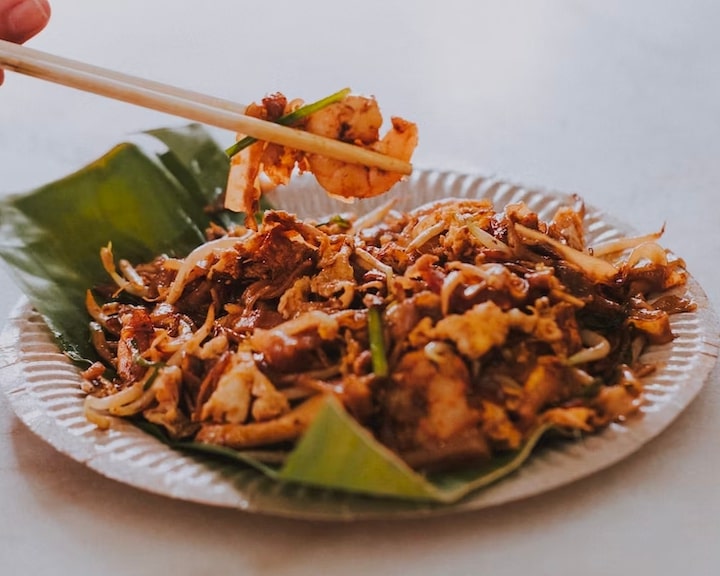
Char kway teow is a popular Chinese dish consisting of flat rice noodles, soy sauce, and a wide variety of other ingredients like Chinese sausage, cockles, bean sprouts, eggs, and more.
- Best place to try: Hill Street Char Kway Teow
- Where: Bedok South Market and Food Centre
- Price: Starts at $4
Roti Prata
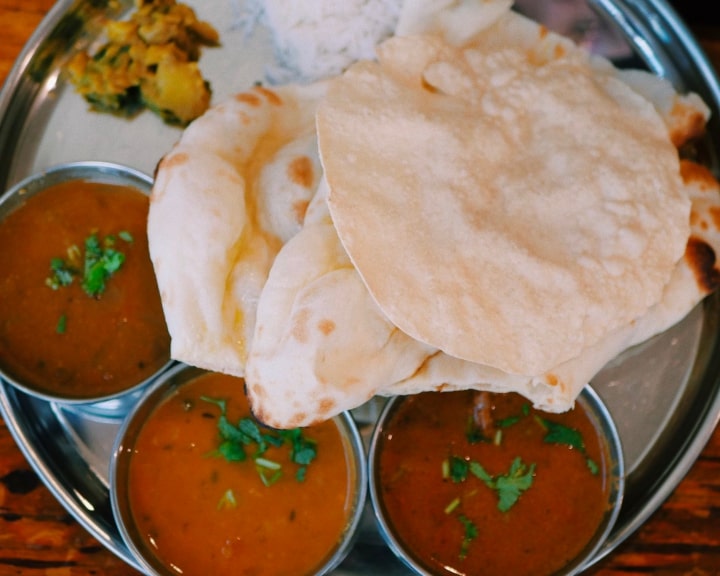
Roti prata is a popular flatbread dish in Singapore, influenced by Indian cuisine and typically doused in curry.
Flour, water, and ghee are used to make the dough, which is then grilled to a crispy exterior and a chewy interior.
- Best place to try: The Roti Prata House
- Where: Upper Thomson Road
- Price: $1.20 to $7.50
Fish Head Curry
From muthuscurry
Fish head curry is a well-known Indian-inspired dish in Singaporean cooking. It normally consists of a sizable fish head cooked with vegetables in a hot, sour curry sauce.
- Best place to try: Muthu’s Curry
- Where: Race Course Road
- Price: $25 to $30
Bak Kut Teh
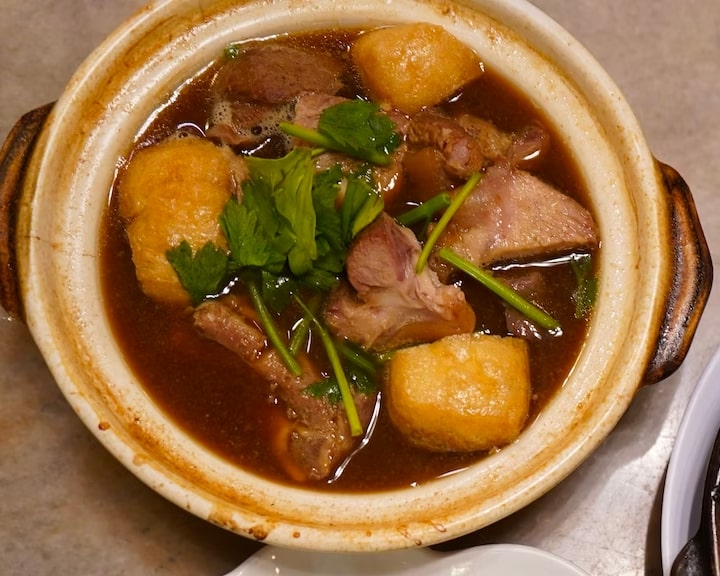
Bak kut teh is a hearty soup made with pork ribs simmered in herb and spice-infused stock, usually served with youtiao (a type of Chinese fried dough) or rice.
- Best place to try: Song Fa Bak Kut Teh
- Where: Suntec City and all across Singapore
- Price: Starts at $7
Satay
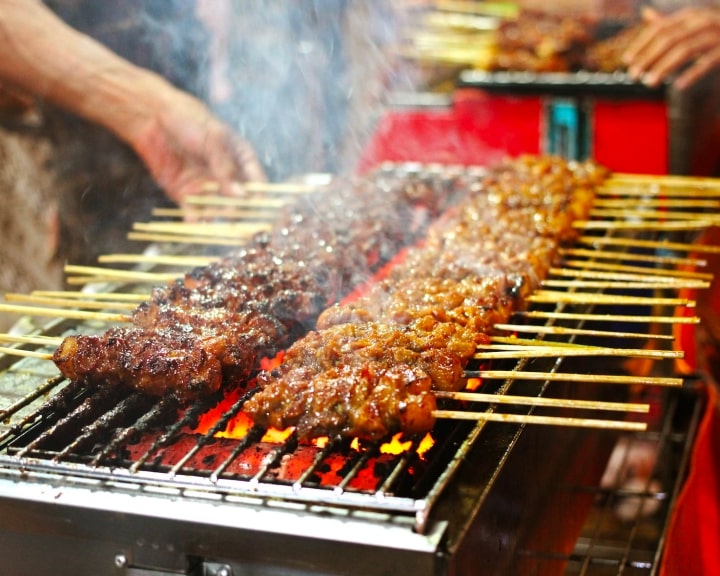
Satay is barbecued meat served on skewers and doused in peanut sauce, along with veggies like cucumber and onion. The meat can be chicken, beef, mutton, or pork.
- Best place to try: Various stalls at Lau Pa Sat
- Where: Raffles Quay
- Price: Starts at $1 per stick
Chili Crab
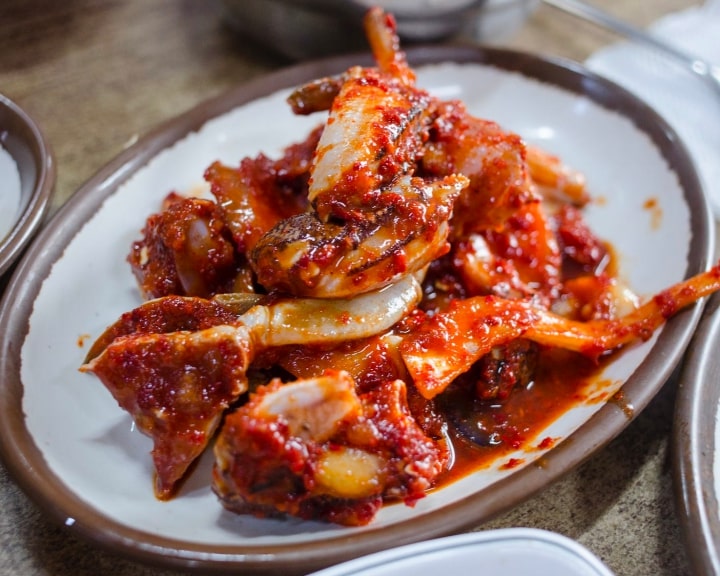
Mud crabs sautéed in a spicy, flavorful, and sweet tomato sauce make up this common seafood dish in Singapore.
Mantou (steamed buns) are typically served with it so that they may soak up the delicious sauce.
- Best place to try: Jumbo Seafood Restaurant
- Where: East Coast Seafood Centre and other parts of Singapore
- Price: Starts are $78
Kaya Toast
From killineykopitiamsg
In Singapore, toast covered with kaya, a sweet and fragrant jam made from coconut milk, eggs, and sugar, is a widely consumed breakfast food.
It’s frequently served with a cup of hot coffee or tea and soft-boiled eggs.
- Best place to try: Killiney Kopitiam
- Where: Katong Square and other spots in Singapore
- Price: $4 to $6
What fusion dishes should I try in Singapore?
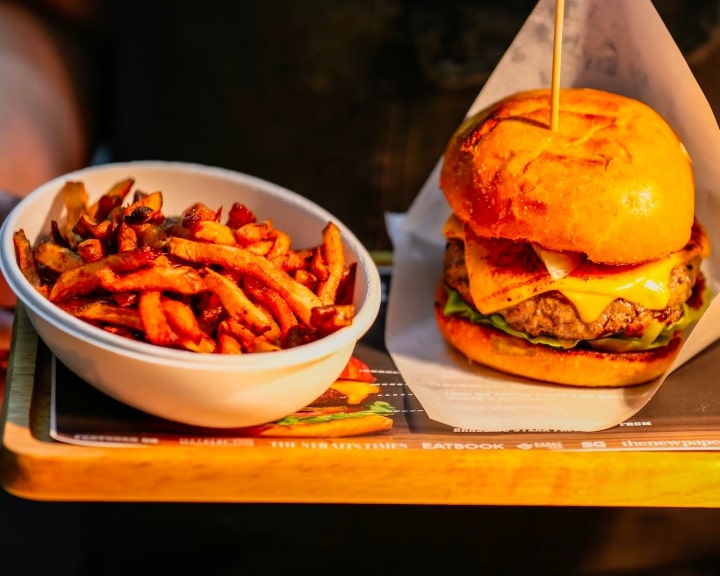
Singapore is a multicultural melting pot, and this is reflected in its cuisine. There are innumerable fusion recipes that combine several cuisines to provide one-of-a-kind flavors.
The following fusion cuisines are a must-try addition to your culinary exploration of Singapore:
Salted Egg Yolk Crab
From vino.journey_bkk
In this well-known fusion dish from Singapore, fresh soft-shell crab is cooked and then topped in a thick, creamy salted egg yolk sauce.
The soft shell can be eaten and gives the food a crunchy texture that goes well with the sweet crab meat and sauce.
- Best place to try: No Signboard Seafood
- Where: Geylang Road
- Price: Starts at $60
Nasi Lemak Burger
From hazeldiary_
The nasi lemak burger is a notable example of fusion cuisine that combines Western-style burger ingredients with traditional Malay flavors.
Between two buns made of rice flour is a fried chicken patty topped with sambal sauce, cucumber slices, and a fried egg.
- Best place to try: Burgs by Project Warung
- Where: Harbourfront Walk
- Price: $5.90
Prawn Laksa Pasta
From crazekitchensg
Prawn laksa pasta is a fusion dish that mixes the flavors of traditional Singaporean laksa and Italian pasta.
Usually, the dish is made with spaghetti or linguine noodles tossed in a creamy sauce that is similar to laksa. Prawns are added on top, and the meal is finished with cilantro and lime wedges.
Where are the types of places to eat in Singapore?

Singapore is known for its wonderful and diverse food scene. There are many places to eat here. The food scene has something for everyone, from street food stands to fine dining restaurants.
| Place | Description | Example Places |
|---|---|---|
| Hawker centers | These are outdoor buildings with a lot of food stalls, small, mobile food carts, or stands. They offer a wide range of cheap local food, so locals and tourists like going there. | Tiong Bahru Market – Seng Poh Rd.Old Airport Road Food Centre – Old Airport Rd.Amoy Street Food Centre – Maxwell Rd.Chomp Chomp Food Centre – Kensington Park Rd.Maxwell Food Centre – Kadayanallur St. |
| Food Courts | These are indoor, air-conditioned food complexes that offer the same kinds of food as hawker centers but with more comfortable seating and services. | Food Republic – Wisma AtriaFood Opera – ION OrchardMarché Mövenpick – Suntec CityKopitiam – TampinesFood Junction – VivoCity |
| Restaurants | Restaurants are places where you can sit down and eat. They offer a variety of foods and prices, from street food to high-end fine eating. | Burnt Ends – Teck Lim Rd.Labyrinth – Esplanade MallOdette – 1 St Andrew’s RdCandlenut – Dempsey Rd.Corner House – E J H Corner House |
| Cafes | Cafes are popular places for young people to hang out. They serve coffee and small snacks like sandwiches, cakes, and sweets. | PS.Cafe – Orchard Rd.Tiong Bahru Bakery – Eng Hoon St.Common Man Coffee Roasters – Martin Rd.Group Therapy Coffee – Duxton Rd.Nylon Coffee Roasters – Everton Park |
| Bars and pubs | These are places that serve alcoholic drinks and, often, food as well. They are popular places to meet people and hang out at night. | Potato Head SingaporeThe Spiffy Dapper – Amoy St.Loof – North Bridge Rd.Smoke & Mirrors – 1 St. Andrew’s Rd.The Other Room – Orchard Rd.The Mad Men Attic Bar – North Canal Rd. |
What are the dining etiquette practices in Singapore?
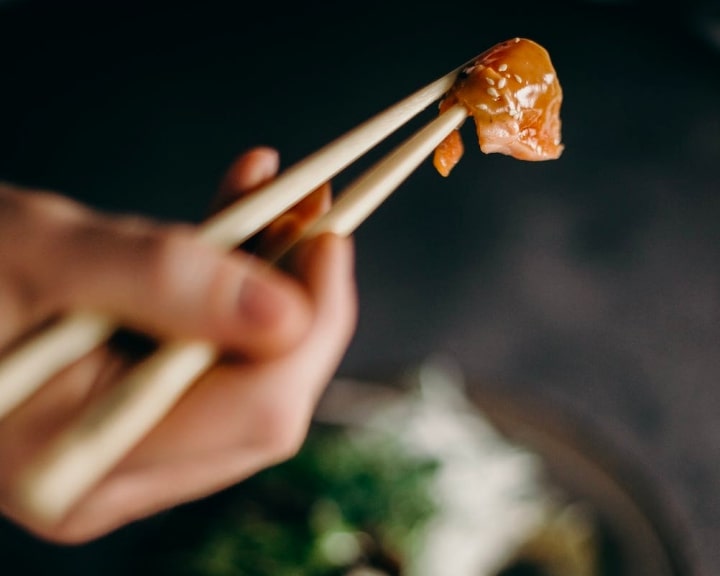
The rules for dining in Singapore are based on local traditions and these change depending on the type of meal. Here are some things you should do and not do:
| Do’s | Reason |
|---|---|
| You should wait until the host or the oldest person starts to eat before you do, especially in a formal setting. | It’s a way to show that you recognize and value the person at the head of the table or the person with the most experience in the group. |
| Hold chopsticks properly. | Chopsticks should be held near the end, between the thumb and index finger, with the middle finger sitting on the bottom chopstick. If you know how to hold chopsticks right, you can escape embarrassing or awkward moments when eating with Singaporeans. They might notice how well you use chopsticks as a sign that you understand and value their culture. |
| Offer to pay when you go out to eat with a group of friends. | It’s a nice gesture that shows you care about your friends and can keep the peace between you and them. It’s also a way to say thanks to friends for meals or favors they’ve provided in the past. |
| Use your right hand to give or receive things from other people. | This is because the right hand has always been seen as the “clean” hand. The left hand is often used to clean oneself, so it’s seen as dirty. |
| Try your best to finish everything on your plate. | It shows you like the food and don’t want to waste it. It’s also a way to show the person who made the meal that you appreciate them. |
| Don’ts | Reason |
|---|---|
| Don’t take tables that have a pack of tissue on top at hawker centers. | This means that the seat or table is saved or already picked by someone else. In a later section, we’ll talk more about hawker centers. |
| Don’t talk or make loud noises while you’re eating. | Talking loudly while eating is considered rude in Singapore. It disrupts the dining experience and shows a lack of respect for others. This is especially important in formal or business settings where professionalism and respect are expected. |
| Don’t blow your nose while you’re eating. | Singaporeans think blowing your nose while eating is rude and unappetizing. It may also spread germs. |
| Don’t touch or take food from other people’s plates without asking. | Even when eating together, Singaporeans value space and respect the property of others. Asking for permission before taking someone else’s food shows that you care about them and respect them. |
